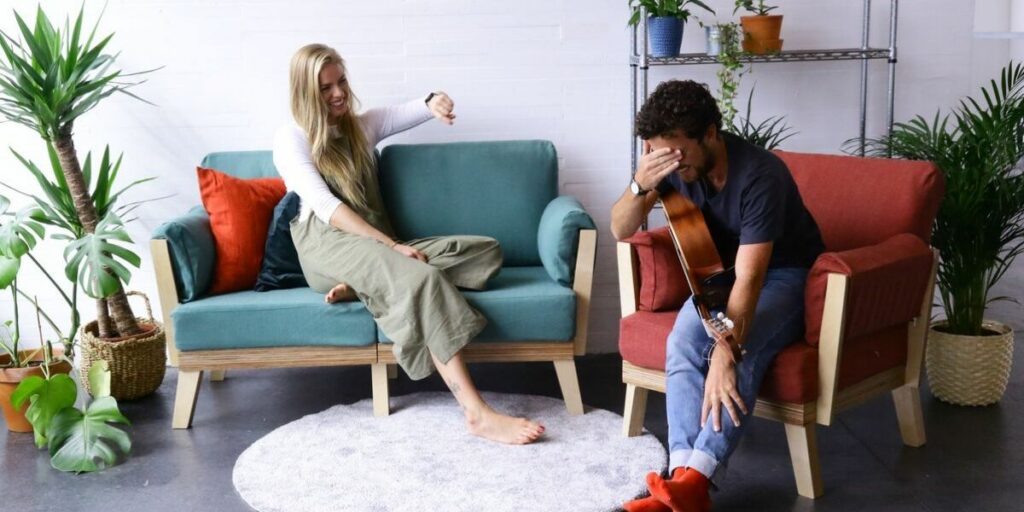Modular sofas, micro insurance, lunchboxes as a service, and an electric delivery tricycle were just a few of the innovations featured in last week’s ThinkDif conference. Here are a few circular economy companies I’ll be watching.
Sofa For Life: Modular furniture
Sofa For Life is designed to grow with you. Start off with the single armchair in your studio apartment. Turn it into a love seat when you find that special someone. Then finally add that third seat to make it a sofa when you finally buy a house. Need some more legroom, add a corner. Imagine an IKEA sofa married a transformer.
The frame is made from sustainable birch plywood and the cushions from recyclable materials like coconut fibers. So even when the sofa can no longer be used, the materials can stay inside a constant loop.
“If waste is human-made, then waste can be unmade,” said Sofa For Life founder Saskia Goeres.
Sofa For Life is based in the UK. The company will launch its Kickstarter campaign soon.

Algramo: Smart packaging
Algramo offers smart packaging that tracks how much you refill and then only charges for the product. Not for the packaging. So you buy the refill rather than the package. Every time you use it, you accumulate a small amount as an incentive for bringing back the package. They are also testing an electric delivery tricycle that brings you refills right at home.
“The main problem with plastic is they last too long. So why not turn the problem into a benefit? So that’s what we’re trying to do,” said Brian Bauer, Algramo’s representative.
Algramo is based in Chile and delivery tricycles are being tested in Las Condes.
Re-Circle: Packaging as a Service
Re-Circle offers a lunchbox as a service. When you get take-out you put a small down payment on an unbranded lunchbox. When you’re done with your meal you can either return the lunchbox to the restaurant or bring it to the next establishment that’s participating. The restaurant is responsible for washing it, but you can also bring it back clean and use the same container again and again. The deposit is about ten Euro’s.
Customers like the service because it’s nicer to eat out of a real bowl than a flimsy plastic or cardboard container. Plus there’s a sturdy lid for easily refrigerating leftovers. Restaurants like it because it’s cheaper than buying single-use containers that end up in the trash said Morath.
The service started three years ago with 24 local restaurants. Now there are almost 1000, including school cafeterias.
“It’s a little thanks to Greta,” said Jeanette Morath, the founder of Re-Circle. By Greta, she means Greta Thunberg, the Swedish activist encouraging children to become activists for climate action.
Recircle is based in Bern Switzerland.
Yerdle ReCommerce
Yerdle is the platform retailers like Patagonia, REI and Eileen Fisher use to re-sell their own branded clothes. For example, Patagonia re-sells used clothes through their WornWear program, and Yerdle is the technology platform, logistics, and program management behind it.
Buying through a program like Patagonia’s Worn Wear is similar to buying a certified pre-owned car said Yerdle founder Andy Ruben. The brands know everything about the item, and customers already love the brand, so it’s easier to re-sell. Yerdle provides the platform to do that.
They have bought back and re-sold a quarter-million items. The majority of those items have been resold in the last 12 months, and the market has grown 20% year over year, according to Ruben.
Yerdle is based in Brisbane, California.
Circular ideas to keep an eye on
A few other innovative ideas come from Renewcell, Open Source Ecology, and Agbogbloshie’s Scrapyard.
RenewCell turns used clothes made from cotton and viscose into a pulp that can be upcycled into new clothes and textiles. Renewcell is based in Sweden and receives used textiles from companies such as US-based BankVogue.
Open Source Ecology sells The Global Village Construction Set. Ever thought of building a tractor from blueprints and a DIY kit? The Global Village Construction Set is for ultimate DIYer’s, but it’s also an affordable option for bootstrappers and small businesses in developing countries.
On a final note, you may have seen the Agbogbloshie Scrapyard featured in the media. It’s filled with people re-using and refurbishing what we call junk in the United States. But this is not a garbage dump. It’s a scrapyard. So I’ll leave you with this TedTalk for a little inspiration from designer DK Osseo-Asare who spoke at the ThinkDif seminar.
